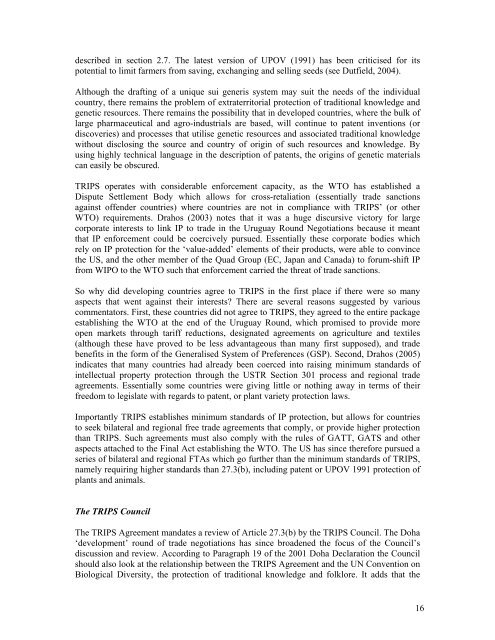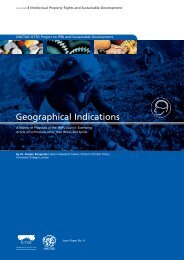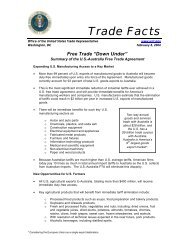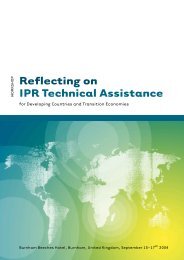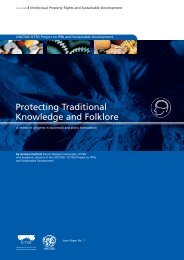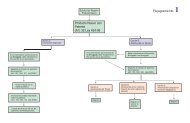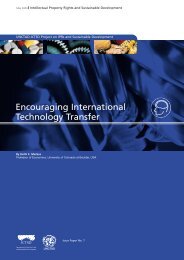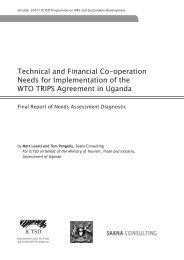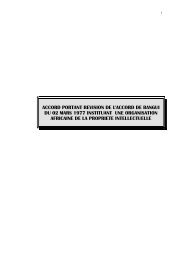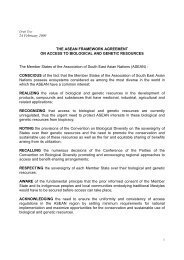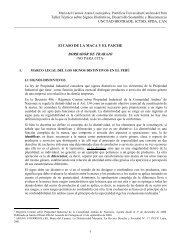Governance and Micropolitics of Traditional ... - IPRsonline.org
Governance and Micropolitics of Traditional ... - IPRsonline.org
Governance and Micropolitics of Traditional ... - IPRsonline.org
You also want an ePaper? Increase the reach of your titles
YUMPU automatically turns print PDFs into web optimized ePapers that Google loves.
described in section 2.7. The latest version <strong>of</strong> UPOV (1991) has been criticised for its<br />
potential to limit farmers from saving, exchanging <strong>and</strong> selling seeds (see Dutfield, 2004).<br />
Although the drafting <strong>of</strong> a unique sui generis system may suit the needs <strong>of</strong> the individual<br />
country, there remains the problem <strong>of</strong> extraterritorial protection <strong>of</strong> traditional knowledge <strong>and</strong><br />
genetic resources. There remains the possibility that in developed countries, where the bulk <strong>of</strong><br />
large pharmaceutical <strong>and</strong> agro-industrials are based, will continue to patent inventions (or<br />
discoveries) <strong>and</strong> processes that utilise genetic resources <strong>and</strong> associated traditional knowledge<br />
without disclosing the source <strong>and</strong> country <strong>of</strong> origin <strong>of</strong> such resources <strong>and</strong> knowledge. By<br />
using highly technical language in the description <strong>of</strong> patents, the origins <strong>of</strong> genetic materials<br />
can easily be obscured.<br />
TRIPS operates with considerable enforcement capacity, as the WTO has established a<br />
Dispute Settlement Body which allows for cross-retaliation (essentially trade sanctions<br />
against <strong>of</strong>fender countries) where countries are not in compliance with TRIPS’ (or other<br />
WTO) requirements. Drahos (2003) notes that it was a huge discursive victory for large<br />
corporate interests to link IP to trade in the Uruguay Round Negotiations because it meant<br />
that IP enforcement could be coercively pursued. Essentially these corporate bodies which<br />
rely on IP protection for the ‘value-added’ elements <strong>of</strong> their products, were able to convince<br />
the US, <strong>and</strong> the other member <strong>of</strong> the Quad Group (EC, Japan <strong>and</strong> Canada) to forum-shift IP<br />
from WIPO to the WTO such that enforcement carried the threat <strong>of</strong> trade sanctions.<br />
So why did developing countries agree to TRIPS in the first place if there were so many<br />
aspects that went against their interests? There are several reasons suggested by various<br />
commentators. First, these countries did not agree to TRIPS, they agreed to the entire package<br />
establishing the WTO at the end <strong>of</strong> the Uruguay Round, which promised to provide more<br />
open markets through tariff reductions, designated agreements on agriculture <strong>and</strong> textiles<br />
(although these have proved to be less advantageous than many first supposed), <strong>and</strong> trade<br />
benefits in the form <strong>of</strong> the Generalised System <strong>of</strong> Preferences (GSP). Second, Drahos (2005)<br />
indicates that many countries had already been coerced into raising minimum st<strong>and</strong>ards <strong>of</strong><br />
intellectual property protection through the USTR Section 301 process <strong>and</strong> regional trade<br />
agreements. Essentially some countries were giving little or nothing away in terms <strong>of</strong> their<br />
freedom to legislate with regards to patent, or plant variety protection laws.<br />
Importantly TRIPS establishes minimum st<strong>and</strong>ards <strong>of</strong> IP protection, but allows for countries<br />
to seek bilateral <strong>and</strong> regional free trade agreements that comply, or provide higher protection<br />
than TRIPS. Such agreements must also comply with the rules <strong>of</strong> GATT, GATS <strong>and</strong> other<br />
aspects attached to the Final Act establishing the WTO. The US has since therefore pursued a<br />
series <strong>of</strong> bilateral <strong>and</strong> regional FTAs which go further than the minimum st<strong>and</strong>ards <strong>of</strong> TRIPS,<br />
namely requiring higher st<strong>and</strong>ards than 27.3(b), including patent or UPOV 1991 protection <strong>of</strong><br />
plants <strong>and</strong> animals.<br />
The TRIPS Council<br />
The TRIPS Agreement m<strong>and</strong>ates a review <strong>of</strong> Article 27.3(b) by the TRIPS Council. The Doha<br />
‘development’ round <strong>of</strong> trade negotiations has since broadened the focus <strong>of</strong> the Council’s<br />
discussion <strong>and</strong> review. According to Paragraph 19 <strong>of</strong> the 2001 Doha Declaration the Council<br />
should also look at the relationship between the TRIPS Agreement <strong>and</strong> the UN Convention on<br />
Biological Diversity, the protection <strong>of</strong> traditional knowledge <strong>and</strong> folklore. It adds that the<br />
16


